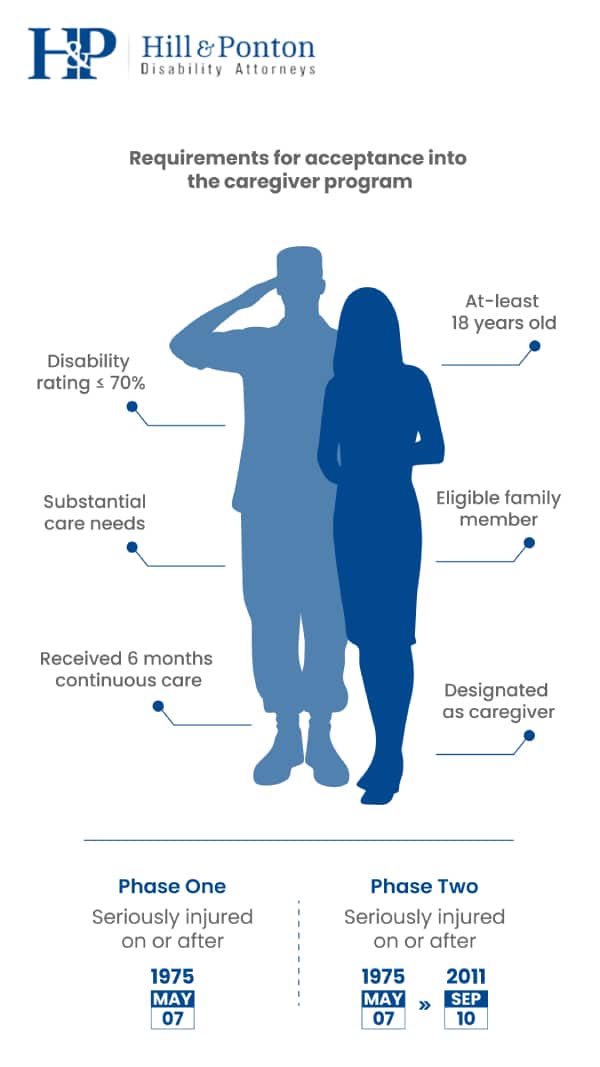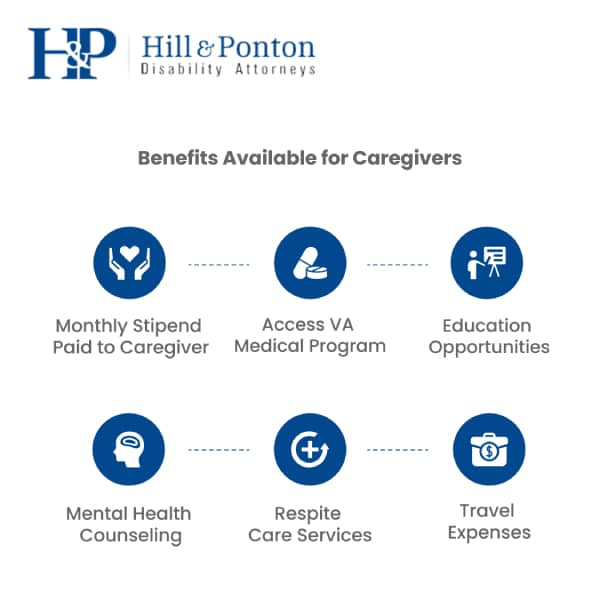The VA Caregiver Program offers essential support and benefits to family members caring for veterans who have sustained serious injuries preventing them from living independently. This support extends to caregivers of post-9/11 and, as updated in 2020, Vietnam-era veterans.
Unlike a loan program, the VA Caregiver Program provides financial assistance and various services to eligible caregivers, aiding in the day-to-day care of veterans in need.
Eligibility for the VA Caregiver Program
What types of disabilities and scenarios may require a caregiver?
Every situation is unique, but often times there are specific instances where a caregiver would be useful for a veteran. Some of them might include:
- Traumatic brain injury
- PTSD
- Anxiety, depression and other mental health concerns.
- Service connected disabilities that require assistance such as blindness and deafness or loss of limb.
- The inability to perform daily living activities like bathing, dressing, and eating meals.
What does the VA classify as ADL (Assisted Daily Living) or personal care services?
In-person personal care services means that the primary family caregiver is providing care to the veteran in their home. This can include things like bathing, grooming, dressing, feeding, and transporting the veteran.
VA will also consider services provided in a nursing home or assisted living facility as in-person personal care service if it is determined that the veteran receives more than 50% of their total care from the VA caregiver.
Eligibility Criteria For Veterans:
- Must have a service-connected disability rating of 70% or higher.
- Need for care must be substantial and due to the service-connected disability.
- Must have received at least six months of continuous, in-person personal care.
Eligibility Criteria For Caregivers:
- Must be at least 18 years old.
- Can be a spouse, child, parent, step-family member, or extended family member living full-time with the veteran.
- A secondary caregiver is eligible for benefits if the primary caregiver is absent.
Applying for the VA Caregiver Program
Applying for the VA Caregiver Program involves a few critical steps designed to ensure that both the veteran and the caregiver meet the necessary eligibility criteria and that all required documentation is accurately submitted.
Step 1: Review Eligibility Criteria
Before beginning the application process, it’s essential to thoroughly review the eligibility criteria for both veterans and caregivers. This ensures that you fully understand the requirements and can gather the necessary documentation and information beforehand.
Step 2: Gather Required Documentation
Collect all necessary documents that will support your application. This includes the veteran’s service and medical records, proof of the veteran’s disability rating, and documentation of the caregiver’s relationship to the veteran. Also, prepare detailed information regarding the daily care needs of the veteran and how these are currently being met.
Step 3: Fill Out the Application
The application form, VA Form 10-10CG, is available for download on the VA website or can be obtained from a local VA office. The form asks for detailed information about the veteran and the caregiver, including personal information, the nature of the veteran’s injuries, and the type of care provided. Be as detailed and accurate as possible to avoid delays.
Step 4: Submit the Application
You can submit the completed application in one of three ways:
- Online: The fastest and most convenient method is to submit the application directly through VA’s official website (va.gov).
- By Mail: Send the completed application to the appropriate VA processing center. The mailing address can be found on the VA website or by contacting a VA representative.
- In Person: Deliver the application to your local VA regional office. This option also allows you to ask questions and receive immediate guidance.
Step 5: Attend the C&P Examination
If the veteran has not recently undergone a Compensation and Pension (C&P) exam, the VA may require one to assess the veteran’s care needs and confirm the service-connected disability rating. This examination is a crucial part of determining eligibility for the caregiver program.
A C&P exam is used to determine the veteran’s level of care needs and whether or not their disability is service-connected. It will also help the VA establish a baseline for future care.
In addition to the previously mentioned ADL’s the VA examiner will note:
- whether the veteran receives all their care at home,
- whether the veteran receives on-going care from a patient aligned team or other VA health care team,
- whether personal care services provided to the veteran by the caregiver cannot be preformed by others simultaneously, and
- how many hours of care the veteran will need per week.
The examiner will also assess any safety concerns, whether the veteran is prone to seizures, has difficulty with life planning, suffers from mental disorders or conditions, mood disorders, and or other conditions, or suffers from sleep irregularity.
Step 6: Await Notification
After submitting the application, there will be a period of review where the VA assesses the provided information and determines eligibility. During this time, you may be contacted for additional information or clarification.
Step 7: Caregiver Training
If approved, primary caregivers are required to undergo specific training provided by the VA. This training is designed to ensure caregivers are prepared for the responsibilities of caregiving, including managing medical tasks, emergency response, and self-care.
Additional Tips for a Smooth Application Process
- Seek Assistance: Consider reaching out to a VA Caregiver Support Coordinator or an accredited VA representative who can provide guidance and help streamline the application process.
- Stay Organized: Keep copies of all submitted documents and correspondence with the VA. This will help if you need to reference them or if there are questions about your application.
- Be Proactive: Don’t hesitate to follow up with the VA if you haven’t received a response within a reasonable time frame. Regularly check the status of your application and communicate with your VA representative.
Are VA procedures confusing you? You’re not alone! Attorney Matthew Hill has written THE book on how to navigate the VA system. Get your own free copy of The Road to VA Compensation Benefits as an ebook or in print.
Get the Free EbookBenefits for Veterans and Caregivers


Recent adjustments may have been made to the stipend amounts and eligibility criteria.
For the most current information about stipend amounts and support, caregivers are encouraged to visit www.caregiver.va.gov or contact the VA Caregiver Support Line at 1-855-260-3274.
Approved caregivers receive:
- A monthly stipend based on the veteran’s care needs and local wage rates for home health aides.
- Access to the VA medical program, training, mental health services, and respite care.
- Reimbursement for travel expenses related to the veteran’s care.
The caregivers program is made up of two phases:
- Phase I is made up of family caregivers of veterans who were seriously injured in the line of duty on or after May 7, 1975.
- Phase II is made up of family caregivers of veterans who were seriously injured in the line of duty between May 7, 1975 and September 10, 2011.
There are three sections of the caregivers program:
- Program of Comprehensive Assistance for Family Caregivers (PCAFC)
- VA Caregiver Support Program (VCSP)
- Program of General Caregiver Support Services (PGCSS)
The PCAFC program provides benefits to caregivers caring for post-911 veterans, and as of 2020, Vietnam-era veterans, while the VCSP program provides benefits to caregivers of veterans with qualifying injuries. The PGCSS program provides support services to all caregivers, regardless of the veteran’s injury status.
The Caregiver Program vs. A&A: Which Is Better?
Attorneys Allison Reddick and Rachel Cheek talk through the main differences and similarities in the Aid and Attendance and the Caregiver Program. They are two different VA Disability Extra Monthly Compensation or Special Monthly Compensation benefits. Find out which one is better for you:
Our disability lawyers are highly experienced in obtaining special monthly compensation for veterans and their spouses. Get a free evaluation today to see how we can help you.
Free case evaluation


